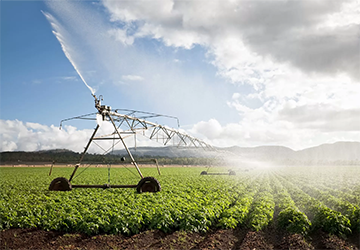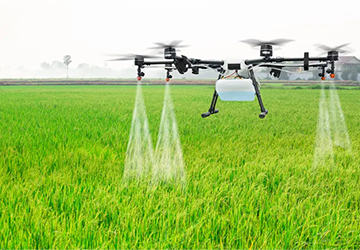Agriculture is poised at a critical nexus, necessitating the urgent adoption of sustainable methodologies more acutely than ever. With the world's population's upward trajectory, the imperatives for efficient, eco-conscious farming practices are paramount. This scenario underscores the pivotal role of tech innovations in farming.

Tech Innovations in Farming: Augmenting Agricultural Proficiency
Tech innovations in farming have precipitated a revolutionary transformation in the management of both crop cultivation and livestock rearing. These progressive advancements champion precision agriculture, which optimizes crop yields while minimizing adverse environmental repercussions.
● Precision Farming: Deploys sophisticated GPS and IoT sensors to monitor agrarian conditions meticulously, optimizing vegetative growth.
● Automated Agricultural Implements: Enhance operational workflows from planting to harvest, boosting productivity while significantly reducing workforce costs.
● Drone Technology: Unmanned aerial vehicles assess crop vitality and manage irrigation with pinpoint accuracy, conserving water and mitigating ecological strain.
These technologies are seminal in establishing a sustainable agricultural paradigm capable of supporting our nutritional needs today and in the future.
Sustainable Agriculture Technologies: Pioneering Eco-friendly Farming Modalities
The integration of sustainable agriculture technologies is vital for mitigating agricultural practices' ecological footprint. These forward-thinking technologies safeguard Earth's natural resources and ensure the durability of farming practices.
● Solar Power Initiatives: Utilization of solar energy to fuel farm operations, slashing reliance on fossil fuels.
● Innovative Water Conservation Techniques: Advanced irrigation solutions that dramatically minimize wasteful water expenditure.
● Organic Farming Practices: Emphasizes using natural inputs, eschewing synthetic pesticides and fertilizers.
The adoption of sustainable agriculture technologies fosters ecological balance and promotes the flourishing of biodiversity.
The Future of Farming with Tech
The trajectory for the future of farming with tech brims with robust potential. It is poised to fundamentally alter the agricultural landscape to make it more sustainable and prolific.
● Genetic Editing Technologies: Innovations in genetic engineering lead to crop varieties that exhibit increased resistance to pests and diseases, thereby reducing the dependency on agrichemicals.
● Artificial Intelligence in Agriculture: AI technologies predict crop yields, identify plant pathogens, and provide real-time, data-driven advisories to optimize agricultural outputs.
● Vertical Farming Advances: This cutting-edge agricultural practice significantly reduces land and water use and adapts seamlessly to urban environments where traditional farming methods falter.
The evolution of the future of farming with technology is contingent upon relentless innovation and the broad-scale adoption of technologies that are in harmony with ecological boundaries while enhancing food security.
Challenges and Prospects
Despite the profound benefits of tech innovations in farming and sustainable agriculture technologies, they present formidable challenges, such as substantial initial investment, technological acclimation amongst the agricultural community, and the necessity for supportive regulatory frameworks.
Nevertheless, the opportunities these technologies unveil far outweigh the impediments. They sketch a blueprint towards a sustainable future, where technological prowess and environmental stewardship coalesce for a healthier planet.
Enhancing Soil Health Through Technological Interventions
Innovative technologies are pivotal in bolstering soil health, a fundamental aspect of agricultural ventures. Healthier soils are integral, fostering enhanced crop robustness and more significant carbon sequestration, helping to counteract climate change.
● Soil Sensors: Cutting-edge sensors scrutinize soil properties continuously, permitting cultivators to fine-tune nutrient and water levels, avoiding excess fertilization and thus boosting soil vitality.
● Biochar Implementation: Porous charcoal enhances soil by augmenting its organic carbon quotient and elevating moisture retention capabilities.
These methodologies are essential for advancing sustainable soil management practices that enhance long-term agricultural viability and productivity.

Integrating Robotic Solutions for Pest Management
Robotic technologies are transforming pest control, providing more accurate and timely interventions and decreasing reliance on chemical pesticides.
● Robotic Weed Control: Self-operating robots with sophisticated vision capabilities pinpoint and eradicate weeds, diminishing resource competition and curbing the need for herbicides.
● Pest Surveillance Robots: These automatons traverse farm fields, employing advanced machine learning algorithms to detect pest outbreaks promptly and precisely, facilitating focused pest management strategies.
This strategy minimizes the ecological impact of extensive pesticide use and supports the health of crops and the surrounding ecosystems.
Advancing Water Resource Management
As water scarcity intensifies globally, state-of-the-art technologies are emerging as crucial solutions for conserving water within the agricultural sector.
● Intelligent Irrigation Systems: Leveraging meteorological data and soil moisture levels, these systems autonomously adjust irrigation schedules to apply water solely when needed and in optimal quantities.
● Agricultural Water Recycling Solutions: New advancements in water recycling enable the processing and reusing of agricultural runoff or wastewater, decreasing freshwater consumption and reducing environmental contamination.
These innovations are vital for optimizing water utilization, particularly critical for sustainable agricultural operations in dry regions or during drought conditions.
Forward-Thinking Strategies for Crop Diversity and Resilience
Promoting crop diversity through technological assistance is crucial for bolstering food security and adapting to the evolving climatic scenarios.
● Genetic Repositories: Both digital and tangible gene banks safeguard a plethora of genetic materials, which are instrumental in cultivating new crop varieties attuned to diverse environmental challenges.
● Climate-Adaptive Crop Development: By harnessing genetic and digital tools, new varieties of crops are being developed with enhanced tolerance to severe weather conditions such as droughts and floods.
These endeavours are crucial for maintaining agricultural biodiversity and ensuring a resilient food system capable of enduring global shifts.
Revolutionary Robotic Interventions for Pest Management
Revolutionary robotic technologies are redefining pest control mechanisms, offering more precise and timely interventions, thereby reducing dependency on chemical pesticides.
● Automated Weed Extermination: Autonomous robotic entities equipped with advanced visual recognition systems meticulously identify and exterminate weeds, thereby reducing competition for essential nutrients and minimizing the necessity for chemical herbicides.
● Robotic Pest Detection: These mechanical sentinels patrol the rural landscapes, utilizing sophisticated machine learning algorithms to identify pest incursions early and accurately, enabling pinpointed pest eradication efforts.
This methodology curtails the ecological repercussions of widespread pesticide utilization and fortifies the health of the crops and the ecosystems enveloping them.
Conclusion
The critical role of technology in fostering sustainable agriculture is increasingly paramount. As we progress, tech innovations in farming and sustainable agriculture technologies will be instrumental in shaping an environmentally sustainable future. The future of farming with tech revolves around innovation and the judicious application of these advancements to promote and preserve the natural environment. The adoption of these technologies is indispensable for the sustainable progression of agriculture.


